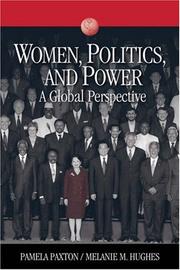| Listing 1 - 6 of 6 |
Sort by
|

ISBN: 9781412927420 Year: 2007 Publisher: Thousand Oaks (Calif.) Pine Forge
Abstract | Keywords | Export | Availability | Bookmark
 Loading...
Loading...Choose an application
- Reference Manager
- EndNote
- RefWorks (Direct export to RefWorks)
Book
Abstract | Keywords | Export | Availability | Bookmark
 Loading...
Loading...Choose an application
- Reference Manager
- EndNote
- RefWorks (Direct export to RefWorks)
Sociology of occupations --- Community organization --- Political systems --- Government --- Politics --- Public law. Constitutional law --- International --- Voting behaviour --- Power --- Politicians --- Political culture --- Political participation --- Women's movements --- Women's suffrage --- Book --- Quota --- United States of America
Book
ISBN: 1483310477 1452275483 Year: 2014 Publisher: Los Angeles : SAGE,
Abstract | Keywords | Export | Availability | Bookmark
 Loading...
Loading...Choose an application
- Reference Manager
- EndNote
- RefWorks (Direct export to RefWorks)
This comprehensive text on women in politics provides a clear and detailed introduction to women's political representation across a wide range of countries and regions, addressing both women's parliamentary representation and women's ascendance to leadership positions as heads of state or cabinet ministers.
Women --- Women --- Representative government and representation. --- Political activity. --- Political activity
Book
ISBN: 9781412974448 1412974445 9781452226514 1452226512 1452223564 Year: 2011 Volume: 168 Publisher: Los Angeles, [Calif.] ; London : SAGE,
Abstract | Keywords | Export | Availability | Bookmark
 Loading...
Loading...Choose an application
- Reference Manager
- EndNote
- RefWorks (Direct export to RefWorks)
'Nonrecursive Models' guides readers through the specification and identification of simultaneous equation models, how to assess the quality of the estimates, and how to correctly interpret results.
Quantitative methods in social research --- Mathematical statistics --- #SBIB:303H10 --- Methoden en technieken: algemene handboeken en reeksen --- Social sciences --- Mathematical models. --- Social Sciences. --- Social Sciences --- Mathematical models --- Social sciences - Mathematical models --- Equations, Simultaneous.
Book
Year: 2008 Publisher: [Washington, D.C. : World Bank,
Abstract | Keywords | Export | Availability | Bookmark
 Loading...
Loading...Choose an application
- Reference Manager
- EndNote
- RefWorks (Direct export to RefWorks)
"In recent years donor countries have committed to dramatic increases in the supply of foreign aid to developing countries. Meeting and sustaining such commitments will require sufficient support among donor country voters and taxpayers. The determinants of public opinion in donor countries on foreign aid have received little attention. This paper examines attitudes to foreign aid with a large, multi-level, cross-national study. It outlines a theoretical rationale for support for foreign aid, discussing the importance of both individual factors and economic and social structures. The theory is tested with multi-level models, including both individual-level and country-level variables to predict positive attitudes. Two datasets are used to measure attitudes in donor countries: (1) the 1995 World Values Survey has information from approximately 6,000 individuals in nine countries and asks a rich battery of questions at the individual-level, and (2) the 2002 Gallup "Voice of the People" survey asks fewer questions of individuals but includes 17 donor countries. Using both surveys combines their distinct strengths and allows tests of individual and national-level theories across disparate samples. The results generally support the predictions that attitudes toward aid are influenced by religiosity, beliefs about the causes of poverty, awareness of international affairs, and trust in people and institutions. "--World Bank web site.
Book
Year: 2008 Publisher: [Washington, D.C. : World Bank,
Abstract | Keywords | Export | Availability | Bookmark
 Loading...
Loading...Choose an application
- Reference Manager
- EndNote
- RefWorks (Direct export to RefWorks)
"In recent years donor countries have committed to dramatic increases in the supply of foreign aid to developing countries. Meeting and sustaining such commitments will require sufficient support among donor country voters and taxpayers. The determinants of public opinion in donor countries on foreign aid have received little attention. This paper examines attitudes to foreign aid with a large, multi-level, cross-national study. It outlines a theoretical rationale for support for foreign aid, discussing the importance of both individual factors and economic and social structures. The theory is tested with multi-level models, including both individual-level and country-level variables to predict positive attitudes. Two datasets are used to measure attitudes in donor countries: (1) the 1995 World Values Survey has information from approximately 6,000 individuals in nine countries and asks a rich battery of questions at the individual-level, and (2) the 2002 Gallup "Voice of the People" survey asks fewer questions of individuals but includes 17 donor countries. Using both surveys combines their distinct strengths and allows tests of individual and national-level theories across disparate samples. The results generally support the predictions that attitudes toward aid are influenced by religiosity, beliefs about the causes of poverty, awareness of international affairs, and trust in people and institutions. "--World Bank web site.
| Listing 1 - 6 of 6 |
Sort by
|

 Search
Search Feedback
Feedback About UniCat
About UniCat  Help
Help News
News